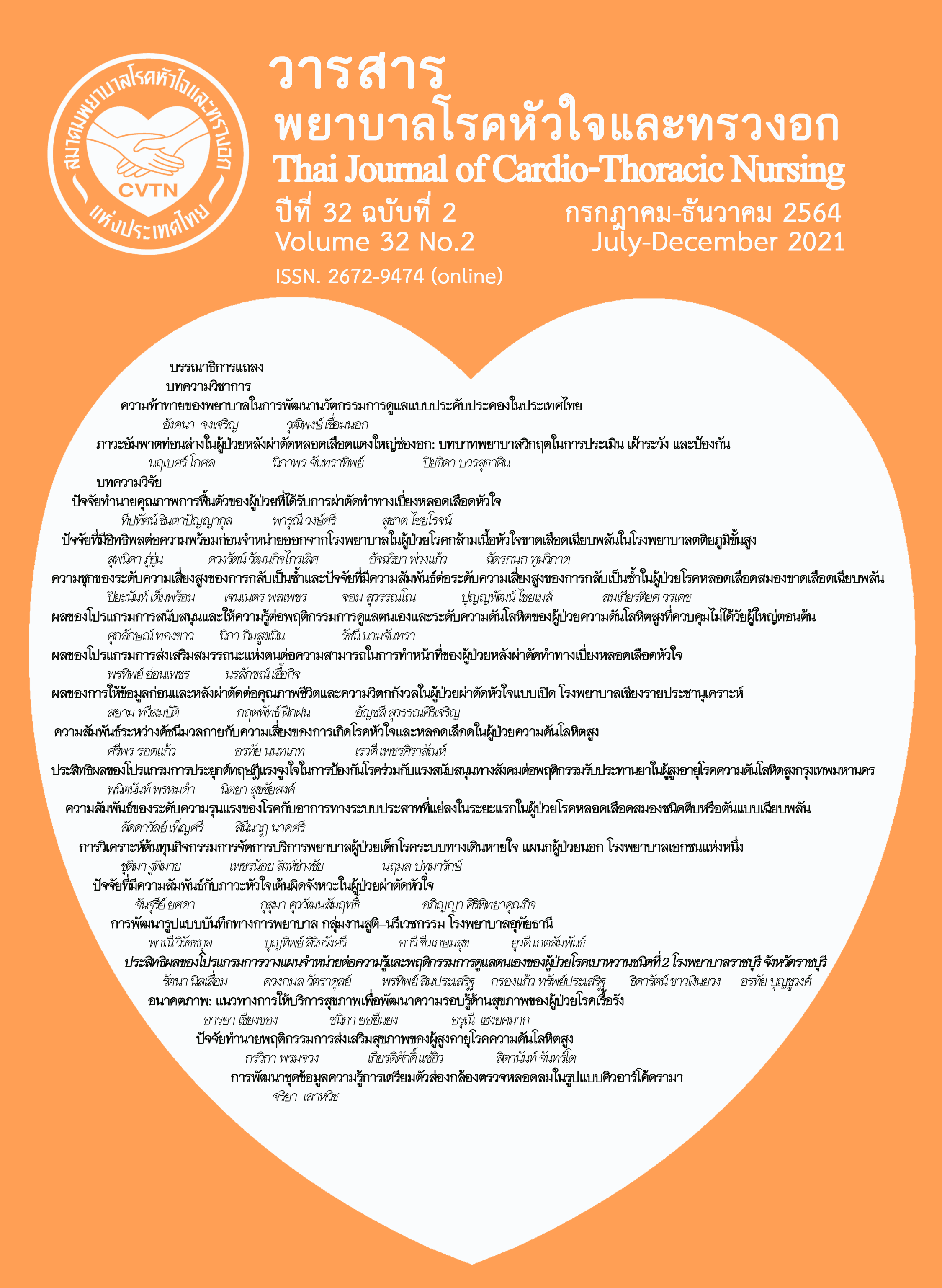ประสิทธิผลของโปรแกรมการประยุกต์ทฤษฎีแรงจูงใจในการป้องกันโรคร่วมกับแรงสนับสนุนทางสังคมต่อพฤติกรรมรับประทานยาในผู้สูงอายุโรคความดันโลหิตสูง กรุงเทพมหานคร
คำสำคัญ:
พฤติกรรมการับประทานยา, ทฤษฎีแรงจูงใจในการรักษาโรค, แรงสนับสนุนทางสังคม, ผู้สูงอายุโรคความดันโลหิตสูงบทคัดย่อ
การวิจัยแบบกึ่งทดลองแบบ 2 กลุ่ม วัดก่อน-หลัง และติดตามผลการทดลอง มีวัตถุประสงค์เพื่อศึกษาประสิทธิผลของโปรแกรมการประยุกต์ทฤษฎีแรงจูงใจในการป้องกันโรคร่วมกับแรงสนับสนุนทางสังคมต่อพฤติกรรมรับประทานยารักษาโรคความดันโลหิตสูง ในกลุ่มผู้สูงอายุ 60-80 ปี จำนวน 44 คน แบ่งเป็นกลุ่มทดลองและกลุ่มเปรียบเทียบกลุ่มละ 22 คน โดยกลุ่มทดลองได้รับโปรแกรมส่งเสริมพฤติกรรมรับประทานยารักษาโรคความดันโลหิตโดยประยุกต์ใช้ทฤษฎีแรงจูงใจในการรักษาโรคและแรงสนับสนุนทางสังคม เก็บรวบรวมข้อมูลด้วยแบบสัมภาษณ์ ประกอบด้วย การรับรู้ความรุนแรง การรับรู้โอกาสเสี่ยง การรับรู้ความสามารถตนเอง การรับรู้ประสิทธิผลของผลลัพธ์ พฤติกรรมการรับประทานยารักษาโรคความดันโลหิตสูง และแรงสนับสนุนทางสังคมจากสมาชิกในครอบครัวและอาสาสมัครสาธารณสุข วิเคราะห์ข้อมูลด้วยสถิติเชิงพรรณนา Independent t-test และ Repeated Measure one-way ANOVA
ผลการวิจัยพบว่า หลังการทดลอง และระยะติดตามผล กลุ่มทดลองมีคะแนนเฉลี่ยการรับรู้ความรุนแรง การรับรู้โอกาสเสี่ยง การรับรู้ความสามารถตนเอง การรับรู้ประสิทธิผลของผลลัพธ์ พฤติกรรมการรับประทานยา และแรงสนับสนุนทางสังคมสูงกว่าก่อนการทดลองและสูงกว่ากลุ่มเปรียบเทียบอย่างมีนัยสำคัญทางสถิติ (p-value < 0.05) ส่วนค่าระดับความดันโลหิตลดลงกว่ากลุ่มเปรียบเทียบ อย่างมีนัยสำคัญทางสถิติ (p-value < 0.05)
ข้อเสนอแนะ: พยาบาลควรนำโปรแกรมส่งเสริมพฤติกรรมการรับประทานยารักษาโรคความดันโลหิตสูงในผู้สูงอายุมาประยุกต์ใช้เพื่อให้เกิดการเปลี่ยนแปลงการปฏิบัติตัวและป้องกันการเกิดภาวะแทรกซ้อนจากโรคได้อย่างต่อเนื่อง
เอกสารอ้างอิง
World Health Organization. A global brief on hypertension. [Internet]. 2013. [cited 2020 May 13]. Available from: http://ish-world.com/down loads/pdf/global_brief_hypertension.pdf.
Office of the Permanent Secretary, Ministry of Public Health. Health at a glance Thailand 2017. [Internet]. 2020. [cited 2020 May 13]. Available from: http://bps.moph.go.th/new_bps/sites/default /files/health%20at%20a%20glance%20thailand%202017.pdf. (in Thai).
Centers for Disease Control and Prevention. Hypertension cascade: hypertension prevalence, treatment and control estimates among US adults aged 18 years and older applying the criteria from the American College of Cardiology and American Heart Association’s 2017 hypertension guideline—NHANES 2013–2016 external icon. Atlanta, GA: US Department of Health and Human Services; 2019.
Thai Hypertension Society. Thai guidelines on the treatment of hypertension. [Internet]. 2019. [cited 2020 May 13]. Available from: http://www.thaiheart.org/images/column1563846428/Thai% 20HT%20Guideline%202019.pdf. (in Thai).
Division of Non-Communicable Diseases. Non-Communicable Diseases Report. [Internet]. 2013. [cited 2020 May 13]. Available from: http://www.thaincd.com/2016/mission/documents-detail.php?id=13486&tid=32&gid=1-020. (in Thai).
Aronow WS, Fleg JL, Pepine CJ, Artinian NT, Bakris G, Brown AS, et al. ACCF Task Force. ACCF/AHA 2011 expert consensus document on hypertension in the elderly: a report of the American College of Cardiology Foundation Task Force on Clinical Expert Consensus Documents. Circulation. 2011 May 31; 123(21):2434-506.
Nguyen QT, Anderson SR, Sanders L, Nguyen LD. Managing hypertension in the elderly: a common chronic disease with increasing age. Am Health Drug Benefits. 2012 May; 5(3):146-53. PMID: 24991317; PMCID: PMC4046467.
Krousel-Wood MA, Muntner P, Islam T, Morisky DE, Webber LS. Barriers to and determinants of medication adherence in hypertension management: perspective of the cohort study of medication adherence among older adults. Med Clin North Am. 2009; 93(3):753-69.
Wangworatrakul W. Suwannaroop N. Moopayak K. Factors predicting to medication adherence among patients with essential hypertension. Journal of The Royal Thai Army Nurse.2017;18(1):131-39. (in Thai).
Yazdanpanah Y, Saleh Moghadam A, Mazlom S, Haji Ali Beigloo R, Mohajer S. Effect of an Educational Program based on Health Belief Model on Medication Adherence in Elderly Patients with Hypertension. Evidence Based Care. 2019; 9(1): 52-62. doi: 10.22038/ebcj. 2019.35215.1895
Sinsap N, Jankra J, Jaiman B. Hypertension in elderly: Silence killer should be aware. Journal of Phrapokklao Nursing College. 2017; 28(1): 100-11. (in Thai).
Rogers RW. Cognitive and physiological processes in fear appeals and attitude change: A revised theory of protection motivation. In Cacioppo JT, Petty RE. (Eds), Social psychophysiology: a sourcebook. New York: Guilford Press;1983. p.153-76.
Kumpiriyapong N, Sasat S. The Effect of health belief programme on medicine used behavior in older persons with hypertension. Royal Thai Navy Medical Journal.2017; 44(3):67-83.
Boer H, Sedel ER. Protection motivation theory. In Conner M, Norman P. (Eds.) Predicting health behaviour research and practice with social cognition models. Hong Kong: Open University Press. Centers for Disease Control and Prevention;1983. p 95-118.
House JS. Work stress and social support. Reading, MA: Addison-Wesley; 1981.
Ingkamanee N, Na Ayuthya SK, Puwarawuttipanit W, Peerapatdit T. Effectiveness of promoting a problem-solving ability program on medication adherence in patients with type 2 diabetic. J Nurs Sci. 2011;29(2): 56-64.
Cohen J. Statistical power analysis for the behavioral sciences (2nd ed.). Hillsdale, NJ Lawrence Erlbaum Associates, Publishers; 1988.
Kamran A, Sadeghieh Ahari S, Biria M, Malepour A, Heyda H. Determinants of patient’s adherence to hypertension medications: application of health belief model among rural patients. Ann Med Health Sci Res. 2014;4(6): 922–27.
Noumani HA, Wu JR, Barksdale D, Knalfl G, Alkhasawneh E. Health beliefs and medication adherence in Omanis with hypertension. J Cardiovasc Nurs.2018; 36(6):518-26.
Barari G, Scafide K, Krall J, Mallinson RK, Weinstein AA. Mediating role of self-efficacy in the relationship between family social support and hypertension self-care behaviors: A cross-sectional study of Saudi men with hypertension. Int J Nurs Pract.2018;25(6): 85-92.
Intaboot K. The effect of a self-management and social support program on new hypertension cases with uncontrolled blood pressure. ODPC.2020;26(1):73-83.
ดาวน์โหลด
เผยแพร่แล้ว
รูปแบบการอ้างอิง
ฉบับ
ประเภทบทความ
สัญญาอนุญาต
ลิขสิทธิ์ (c) 2022 วารสารพยาบาลโรคหัวใจและทรวงอก

อนุญาตภายใต้เงื่อนไข Creative Commons Attribution-NonCommercial-NoDerivatives 4.0 International License.
บทความนี้ยังไม่เคยตีพิมพ์หรืออยู่ในระหว่างส่งไปตีพิมพ์ในวารสารอื่น ๆ มาก่อน และกองบรรณาธิการขอสงวนสิทธิ์ในการตรวจทาน และแก้ไขต้นฉบับตามเกณฑ์ของวารสาร ในกรณีที่เรื่องของท่านได้ได้รับการตีพิมพ์ในวารสารฉบับนี้ถือว่าเป็น ลิขสิทธิ์ของวารสารพยาบาลโรคหัวใจและทรวงอก






